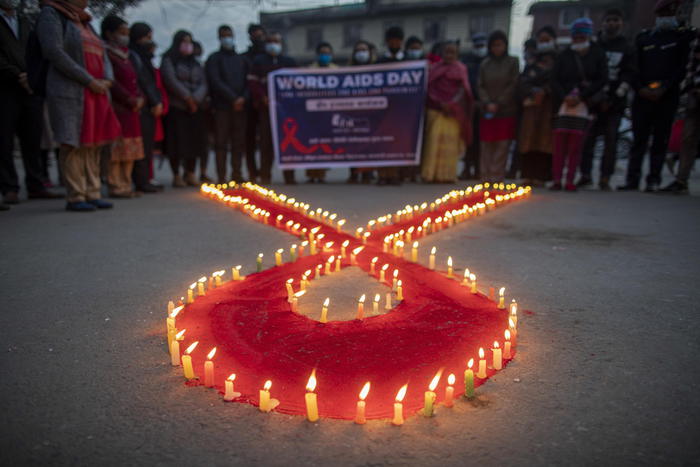With the drugs available today, you will no longer die of AIDS if the disease is caught and treated in time, but it is not yet possible to eradicate the HIV virus from the body. The effectiveness of the treatments has improved and side effects have decreased, but the vaccine remains an open challenge, even if the eyes are now on the one with mRna technology. Just as the challenge, launched by the World Health Organization, to eradicate the epidemic by 2030 remains open. 40 years after the first diagnosis of AIDS, a disease that has claimed a total of 45,000 victims in Italy alone, this is the picture that emerges on the eve of World AIDS Day which is celebrated on December 1st.
Since the discovery of the first cases of HIV, it is estimated that the disease has affected 78 million people worldwide and that 35 million people have died from AIDS-related diseases.
"Since 1981, the year in which the first cases of AIDS were reported - explains the director of Infectious Diseases of the Irccs Policlinico Gemelli in Rome, Roberto Cauda - extraordinary results have been obtained, allowing HIV to be treated in the same way as other chronic diseases. From the desperation of the first years we have moved on to hope and today to cure. But the struggle is not over yet ". The development of antiretroviral therapies has made the disease chronic: the virus is prevented from replicating and spreading in the body, thus becoming fatal for the patient. "This - explains Gianni Sava, professor of pharmacology at the University of Trieste and director of the Italian Society of Pharmacology (SIF) - has allowed us to focus attention on increasingly effective and better tolerated therapies,even if there remain critical issues that research is trying to answer, such as the decrease in efficacy over time, the onset of resistance and toxicity. "The new formulations of long-acting drugs are an effective and help overcome the problem of adherence to therapy. But, unlike antiretrovirals against hepatitis C, those for HIV cannot eradicate the virus from the body, adds Sava, because "they only act on replicating viruses activated, not on latent reservoirs. This is why the therapy lasts a lifetime ".they are an effective response and help overcome the problem of adherence to therapy. But, unlike what antiretrovirals against hepatitis C do, those for HIV cannot eradicate the virus from the body, Sava adds, because "they only act on activated replicating viruses, not on latent reservoirs. it lasts a lifetime ".they are an effective response and help overcome the problem of adherence to therapy. But, unlike what antiretrovirals against hepatitis C do, those for HIV cannot eradicate the virus from the body, Sava adds, because "they only act on activated replicating viruses, not on latent reservoirs. it lasts a lifetime ".
After all these years, what is missing is above all an inexpensive, effective and safe vaccine. A large number of candidates have been tested, based on different strategies but, the experts explain, it remains an open challenge. One answer is that the political will and investment that spurred the development of the Covid vaccine is largely lacking in AIDS vaccine research. But another lies in the complexity of the virus. "HIV mutates much more easily than Covid and therefore it is more difficult to generate the neutralizing antibodies that could prevent infection," explains Olivier Schwartz, head of the Virus and Immunity Unit at the Pasteur Institute in Paris.
Help could come from technologies in use today against Sars-Cov-2. One of the vaccines under study, albeit still in its infancy, uses messenger RNA and involves the American Moderna. "The use of mRna platforms made on Covid - explains to ANSA Andrea Antinori director of the UOC Viral Immunodeficiencies of the National Institute of Infectious Diseases Spallanzani - will open new doors, potentially interesting for HIV, but for now they are hypotheses or hopes .
Despite the announcements made in the past years, it is unfortunately a road paved with failure. The only platform being tested on humans is an adenoviral vector, the data are awaited, but for now it does not seem to be giving great results: a study on African women has failed, another on European and American men is still in progress ".
While waiting for the vaccine, attention is focused on testing and prevention, "also through pre-exposure prophylaxis (Prep), a drug therapy that is proving to be very effective in preventing contagion in people at risk", explains Antinori.
What is important, concludes Matteo Camporeale, vice president of the Italian Red Cross, is that "we must not let our guard down on AIDS, because, despite the fact that diagnoses in Italy are decreasing, the number of infected young people is growing".
In 2021 alone, the AIDS Freephone of the Istituto Superiore di Sanità received 6,219 phone calls from users who received useful advice and indications on where to take the test.









